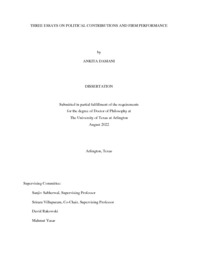
ATTENTION: The works hosted here are being migrated to a new repository that will consolidate resources, improve discoverability, and better show UTA's research impact on the global community. We will update authors as the migration progresses. Please see MavMatrix for more information.
Show simple item record
| dc.contributor.advisor | Sabherwal, Sanjiv | |
| dc.contributor.advisor | Villupuram, Sriram | |
| dc.creator | Damani, Ankita | |
| dc.date.accessioned | 2022-09-15T12:34:40Z | |
| dc.date.available | 2022-09-15T12:34:40Z | |
| dc.date.created | 2022-08 | |
| dc.date.issued | 2022-08-12 | |
| dc.date.submitted | August 2022 | |
| dc.identifier.uri | http://hdl.handle.net/10106/30940 | |
| dc.description.abstract | The interaction of politics with financial markets and the macroeconomy has received increasing attention in recent years. Extant literature identifies the significant impact of political connections on firm value. However, several questions in this area remain unanswered.
My dissertation consists of three essays. In the first essay, I examine the impact of economic policy uncertainty (EPU) on total campaign contributions and the relative contributions to Republicans and Democrats. I find that the total Political Action Committee (PAC) contributions by firms increase following an increase in EPU. This is also true for the contributions to each major political party, i.e., Republicans and Democrats. I also find that the contribution to Republicans relative to Democrats, as measured by the proportion of contribution to Republicans and the gap between Republican and Democratic contributions, increases after heightened EPU. Thus, while contributions to both parties increase, the increase is more for Republicans. I find that PAC contributions help mitigate the negative impact of EPU on firm performance, proxied by return on assets. I also investigate the relationship between contributions and EPU for sub-samples such as conservative and liberal firms, etc.
The second essay examines the mechanism behind the impact of Real Estate Investment Trusts (REIT) political contributions on firm value. I find that REITs that politically contribute have better operational performance in the following year. Contributing REITs experience lower systematic and idiosyncratic risk in the following year. I also find that REITs with a large pipeline of properties under development contribute more to political candidates through the National Association of Real Estate Investment Trusts Inc. (NAREIT) PAC. In addition, contributing REITs with a large pipeline of undeveloped properties experience higher fund flow from operations (FFOs) and lower risk in the following year.
In the third essay, I analyze the difference between campaign contributions by highly regulated firms and less regulated firms. I find that highly regulated firms contribute more than less regulated firms. Both highly regulated and less regulated firms donate more to Republicans than Democrats. The contributions to Republicans relative to Democrats are much greater when Republicans have a majority. For both chambers of Congress, contributions by heavily regulated firms to Republicans and Democrats increase when their party has a majority. I also find a positive relation between contributions by heavily regulated firms and future returns, which shows that the connections built through contributions are economically valuable. | |
| dc.format.mimetype | application/pdf | |
| dc.language.iso | en_US | |
| dc.subject | Political contributions | |
| dc.subject | Economic policy uncertainty | |
| dc.subject | REITs | |
| dc.subject | Regulated firms | |
| dc.title | Three Essays on Political Contributions and Firm Performance | |
| dc.type | Thesis | |
| dc.degree.department | Finance | |
| dc.degree.name | Doctor of Philosophy in Finance | |
| dc.date.updated | 2022-09-15T12:34:40Z | |
| thesis.degree.department | Finance | |
| thesis.degree.grantor | The University of Texas at Arlington | |
| thesis.degree.level | Doctoral | |
| thesis.degree.name | Doctor of Philosophy in Finance | |
| dc.type.material | text | |
Files in this item
- Name:
- DAMANI-DISSERTATION-2022.pdf
- Size:
- 1.223Mb
- Format:
- PDF
This item appears in the following Collection(s)
Show simple item record


